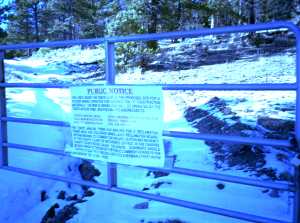Review by George Sibley
Mountain Life – May 2002 – Colorado Central Magazine
Liz Caile: A Life at Treeline (Columns by Liz Caile)
Edited by Kay Turnbaugh, Kate Readio & Claudia Putnam
Perigo Press, KLT Communications, Box 99, Nederland, CO 80466″
ISBN 0-9702532-0-6
NEDERLAND, COLORADO, at the other end of Boulder Canyon from the little city everyone loves to hate, seems to be best known these days as the home of the Frozen Dead Guy — a man being kept on ice by his descendants until medical science comes up with a way to resurrect him. Nederland deserves better than that — although it is that kind of a western mountain town where such things are more likely to happen than, say, down the canyon in the city of the future. Geographically, Nederland may not be in Central Colorado, but spiritually it’s very close.
One of the better things about Nederland is The Mountain-Ear, a weekly newspaper of the type that knows where it is, and whereof it speaks, with an appropriate mix of salt and spice along with its meat and potatoes news. And one of the best things about The Mountain-Ear was the weekly column by Liz Caile, which ran from the mid-1970s until her death in 1998.
Liz Caile grew up in Boulder, but — like others for whom Boulder got a little too upscale — she moved up the canyon to the Nederland area with her young son after a divorce, and she became (to borrow a good phrase from her book) “profoundly located.”
Caile went to work for Kay Turnbaugh, founder, editor and publisher of The Mountain-Ear, as a reporter, and then began writing columns that were grounded in her own life and the life of the mountains and valleys above Boulder. But her columns were also linked to much more global themes of social and environmental justice.
Her general perspective could probably be classified as “neo-hippie environmentalist,” but she brought a lot of authentic experience and class to the genre. Caile walked her talk for a long time.
When I first (and last) saw the movie, The Big Chill, I was mildly disgusted with its whiny premise that everyone from the Sixties generation had either sold out (out of economic necessity, of course) or committed suicide. The fact is, a lot of people are still trying to live out the dreams they hatched back in the 1960s, and a lot of them are hanging out — like Caile did — in places around the West like Nederland (and Central Colorado). And if the best they’ve been able to do is a kind of personal standoff with the most powerful, aggressive and consumptive society in human history, that strikes me as an honorable life.
Some of this book is what you would expect a book subtitled “A Life at Treeline” to be — the nature-writing obligatto. Like Thoreau, Abbey, Leopold, and the rest of that genre, she rings the changes of the natural world and its seasons, and does it with poetic grace. Caile catches the full panoply of random soft and harsh, beautiful and bitter one can encounter in a single afternoon walk in her part of the Rockies. She is as good as any of them at evoking her place.
But I think what she does best in this collection is to explore the full and often frustrating complexity of “the simple life.” Occasionally Caile gets a little preachy in the whole-wheat mode of the “simpletopia movement,” but more often she is honestly contemplating the challenges that living with frugality and integrity pose for a mountain mama today. She ponders the real difficulties as well as the blessings of trying to live without a car when one doesn’t have a trust fund and has to get to work regularly.
The edge-zone, ecotone, between the technologically altered human world and the living earth is a sharper and harder edge on “the Front Range” of Colorado than it is in a lot of other places. There are easier places to seek the simple life, and Caile explores this challenge with real vigor, wry humor and imagination.
“I have my own peace to make with my times and my environment,” Caile says. And in another place: “I want to take some of my craziness and bury it ritually in the right place in the earth, to find a cure for my restlessness in plants and planets, roots, and rituals. I want to strengthen my life choices — conceived through intuition — with stories about things that are mine from living amongst them and watching them.” This kind of active wrestling at the interface of the human world and nature’s earth makes this book rich and worthy.
Caile died “untimely,” at 53 of a brain tumor. But a lot of people who live a lot longer never achieve the kind of intellectual and spiritual ripeness she scattered behind her in these weekly offerings. I’m grateful to Turnbaugh and Caile’s other friends for assembling this collection. Their labor of love illuminate’s Liz Caile’s insight — and her place.
–George Sibley

